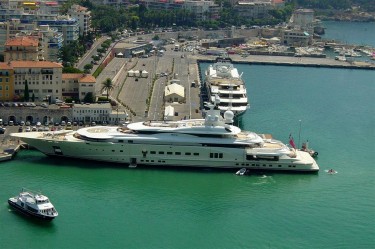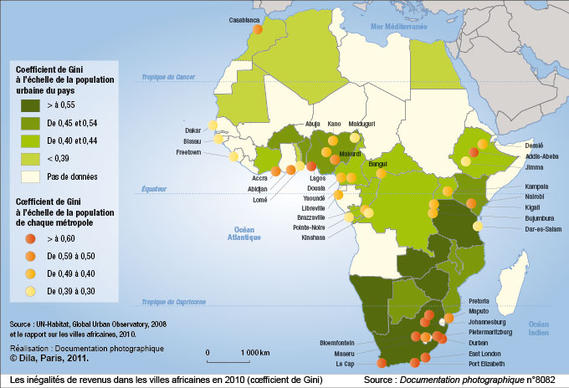Thousands of people are demonstrating on the streets to protest against low salaries, the high cost of living and an insufficient state safety net.
A reaction to austerity measures in Greece? Or a follow-up to the Arab Spring? No, these are protests for greater equality in Sub-Saharan Africa, most recently in Burkina Faso.
The widening gap between rich and poor is as troubling in Africa as in the rest of the world. In fact, many Africans believe that inequalities are becoming more marked: A tiny minority is getting richer while the lines of poor people grow out the door. The contrast is all the more striking in Africa since the poverty level has been at a consistently high level for decades, despite the continent's significant average GDP growth.

The second most expensive yacht in the world, belonging to the son of Teodoro Obiang Nguema Mbasogo, President of Equitorial Guinea – Public domain
A columnist from the independent daily L'Observateur Paalga in Burkin Faso explains the general feeling of discontent [fr]:
Les uns prennent l’avion pour aller soigner un rhume des foins pendant que les autres bouffent les pissenlits par la racine parce qu’ils n’ont pas l’argent pour aller traiter un simple palu.
Some take a plane to get treated for hay fever, while others are pushing up daisies because they can’t afford basic malaria treatment.
However, growth in Africa is expected – the World Bank paints an optimistic picture of African potential, but warns against persistently high inequalities:
Economic growth in Sub-Saharan Africa (SSA) remains strong with growth forecasted to be 4.9% in 2013. Almost a third of countries in the region are growing at 6% and more, and African countries are now routinely among the fastest-growing countries in the world […] [however the report] notes that poverty and inequality remain “unacceptably high and the pace of reduction unacceptably slow.” Almost one out of every two Africans lives in extreme poverty today.
Denis Cogneau, responsible for research at the Institute of Research for Development (IRD), explains that these inequalities in Africa have a well-defined historical origin [fr]:
Les États postcoloniaux ont hérité d’institutions économiques et sociales extractives, caractérisées par un dualisme extrêmement marqué entre un secteur formel de taille réduite, et un vaste secteur informel incluant la paysannerie. De même, beaucoup de pays se caractérisent par un dualisme scolaire et sanitaire, caractérisé par la coexistence d’institutions d’élite publiques et privées coûteuses situées dans la capitale, et d’un secteur de base (écoles primaires et dispensaires) faiblement doté en personnel, médiocrement approvisionné et inégalement réparti sur le territoire. Dans ce contexte, l’école a joué un rôle très dangereux, car elle a été (et est toujours) l’une des clefs d’accès, «non seulement aux emplois dans le secteur moderne, mais aussi aux positions dans l’appareil d’État et au pouvoir politique, suivant en cela les évolutions des sociétés européennes». L’inégalité des chances dans l’accès implique, par conséquent, une reproduction plus accentuée des élites politiques.
Postcolonial states inherited extractive economic and social institutions, characterised by a sharply marked dualism between a small formal sector and a huge informal sector, including farmers. Similarly, many countries are characterised by a dualism in education and health, distinguished by the coexistence of expensive, private and public elite institutions situated in the capital, and a core sector (primary schools and health centres) lacking personnel, poorly stocked, and unevenly spread out across the region. In this context, school plays a very dangerous role, as it was (and still is) one of the keys of entry “not only to jobs in the modern sector, but also to positions in the state apparatus and political power, mirroring the evolution of European societies”. Consequently, the unequal chances of gaining access imply a more marked reproduction of the political elite.
What measures can be taken to reduce these inequalities?
At a a local level, efforts are often not made to understand the exact circumstances that lead to growing inequality. Several organisations have implemented tools to monitor the lives of vulnerable populations in order to clarify the reasons behind it.
In Madagascar, CIRAD (a French research centre working with developing countries to tackle international agricultural and development issues) has proposed the creation of an observatory to carry out monitoring and improve living standards in rural areas [fr]:
Le Réseau des observatoires ruraux (ROR) constitue un dispositif de suivi et d’analyse des conditions de vie des ménages ruraux. Un des objectifs principaux est d’appréhender l’évolution de la situation des ménages ruraux et l’impact des mesures publiques et des chocs externes sur ces ménages. Chaque observatoire comporte un panel de 500 ménages sur des sites choisis de manière raisonnée avec le bailleur. Le questionnaire couvre les principaux aspects des la vie des ménages sur une période de 12 mois. Les résultats permettent une comparaison des situations dans le temps (par année) et dans l’espace (entre les observatoires).
The network of local rural observatories (ROR) consists of a tool that tracks and analyses living conditions in rural households. One of the principal objectives is to gain an understanding of the evolution of the situation in rural households and the impact that public measures and external shocks have on these households. Each observatory is made up of a panel of 500 households in sites chosen in agreement with the landowner. The questionnaire covers the main aspects of household life over a 12-month period. The results mean we can make a comparison in time (per year) and in space (between observatories).
Sexual inequality in Burkina Faso has been identified as a significant barrier to development, as studies have shown that the participation of women in the active life of a country has a considerable impact on its development. Bougnan Naon explains what the Dakupa Association is doing [fr] on this topic in the Boulgou province:
L'enjeu du projet est de permettre la création d'un réseau fonctionnel avec des membres compétents pour influencer les attitudes/pratiques traditionnelles, ainsi que les politiques et stratégies locales de lutte contre les inégalités de genre [..] (L'objectif est de): former 50 acteurs-clefs locaux aux stratégies de prise en compte du genre dans la mise en œuvre des projets et programmes par an, d'organiser des suivis-supervisions pour faciliter l'application effective de l'approche (maîtrise des outils et de l'identification d'actions genre pertinentes) par les ONG au profit de leurs cibles.
The aim of the project is to enable the creation of a functional network with competent members in order to influence traditional attitudes/practices, as well as local policies and strategies which fight against gender inequalities […] (The objective is to) create 50 local key players with strategies to ensure gender is taken into account when launching projects and programs each year, and for the NGO to get closer to its targets by organising supervisors to facilitate the effective application of the approach (learning the tools and identifying pertinent gender actions).








2 comments